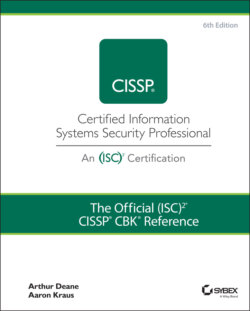Читать книгу The Official (ISC)2 CISSP CBK Reference - Leslie Fife, Aaron Kraus - Страница 95
Civil
ОглавлениеCivil law governs relations and interactions between private entities. The plaintiff in a civil case sues for compensation for a loss or relief from some type of dispute. As information security practitioners, we may be called on to support our clients when they are either plaintiffs or defendants in civil suits. The following are examples of possible civil actions that a security professional, like you, may be involved in:
Your organization is the plaintiff: If someone accesses your production environment without authorization and steals data, causing harm to your organization, your organization might sue the perpetrator for damages (restitution for the harm that was caused). You may be called on to oversee collection of evidence (e.g., logs from penetrated hosts, intrusion detection systems, and network appliances) proving the defendant caused the harm. (Note: This may be in addition to criminal action brought by the government against the defendant.)
Your organization is the defendant: If a former employee accuses the organization of creating a hostile work environment, you may have to oversee collection of evidence (such as emails between managers and executives discussing how employees are treated), as well as preventing the destruction of potential evidence (referred to as destruction hold notice, preservation notice, litigation hold, or similar terms) upon request by courts or attorneys.
Unlike criminal law, in civil proceedings, the usual standard of proof is preponderance of the evidence, meaning it is a much lower burden of proof. Preponderance of the evidence is a simple majority of fault/liability; if the plaintiff can prove to the court that the defendant is even 50.1 percent culpable for the damages, the defendant will lose the civil case.
In a civil proceeding, there is no question of guilty versus not guilty but rather liable versus not liable. If the defendant is found liable, they may be ordered to pay for damages, to stop an activity that is harming the plaintiff, or to honor a contract or agreement into which they had previously entered. Unlike criminal sentences, a litigant cannot be jailed or put to death for liability in a civil lawsuit. However, if a civil litigant refuses to obey a court order, it can result in a contempt of court charge, which could eventually lead to jail time.
Because the burden of evidence and stakes involved in losing a civil case are much lower than they are in criminal cases, the level of effort in collecting and processing the evidence is likewise lower. This is not to say that evidence in civil cases can be handled in a haphazard or careless manner; due care must still be taken to perform actions in a suitable, professional way. However, in civil cases, investigation and evidence collection will not be performed by badged law enforcement personnel and government agents; instead, it is done by information technology and security professionals, such as CISSPs.
Similar to criminal trials, there are rules as to what evidence may be used in a civil trial. Collected evidence that is deemed unreliable may be excluded by a judge presiding over the trial. Care should be taken to retain original copies of evidence collected by an investigator, and chains of custody should be well documented. Original evidence should never be altered, with very few exceptions, and without direct instructions from counsel who is overseeing an investigation or handling the case. Spoliation of evidence (i.e., altering or destruction of the original) can lead to exclusion of evidence in a case or, in some situations, can lead to a separate lawsuit for the damages resulting from the spoliation.
If there is uncertainty about the rules surrounding the collection and handling of evidence for a civil lawsuit, consultation with a digital forensic expert or counsel can be helpful.
